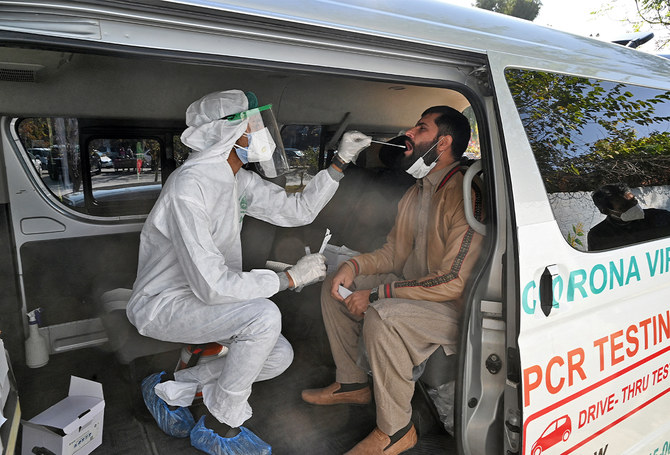ISLAMABAD: Pakistan has made a negative polymerase chain reaction (PCR) test mandatory for all passengers above 6 years flying into the country, its Civil Aviation Authority (CAA) said on Tuesday, as an omicron-fueled fifth wave of coronavirus infections gains momentum in the South Asian nation.
Pakistan reported 630 new coronavirus cases and two fatalities in the last 24 hours, according to official figures. The country reported 708 new infections on Monday, the first time daily infections crossed the 700 mark since October 30, 2021.
In a statement released on Monday, the National Command and Operation Center (NCOC), which oversees the country’s pandemic response, said the omicron-driven fifth wave was spreading at a “great pace.”
“Valid negative PCR test result conducted within 48 hours prior to commencement of travel to Pakistan. This is applicable for all passengers above 6 years of age,” the CAA said in its new pre-departure guidelines.
“Mandatory COVID-19 vaccination and proof of COVID-19 vaccination. This is applicable for all passengers above 15 years of age.”
The South Asian nation has abolished its Category B and C of countries. Previously, arrivals from countries in Category B required a negative COVID-19 PCR test taken 72 hours before departure, while Category C list meant a “complete ban on inbound travel.” Passengers coming from countries in Category A did not require a negative PCR test until now.
The new blanket guidelines will be effective from January 5.
The country also issued the following on-arrival guidelines for passengers above 6 years:
Rapid Antigen Testing upon arrival for all direct flights from Europe
Rapid Antigen Testing upon arrival of a minimum of 50 percent inbound flights from the United Arab Emirates (UAE), Saudi Arabia and Qatar
Selective Rapid Antigen Testing for all inbound flights other than flights mentioned above
The development comes hours after Pakistan’s Director General Health Dr. Rana Muhammad Safdar said the country would adopt a “bi-pronged strategy” to deal with the fifth wave of coronavirus and a surge in cases of the omicron variant.
“Government of Pakistan going for bi-pronged strategy of fast-tracking vaccination alongside standard operating procedures,” Safdar told Arab News. “We would keep on monitoring and mapping new clusters of cases for targeted containment measures.”
The DG health said the threat of the omicron variant was “definitely serious given very high transmissibility and continued challenges of global vaccine equity.”
However, he said it was a good omen that Pakistan had achieved its goal of vaccinating over 70 million of its 220 million population by the end of 2021.
On Monday, Dr. Mumtaz Ali Khan, a focal person at the National Institute of Health in Islamabad, told Arab News the omicron variant was now transmitting locally in Pakistan.
“Vaccination of maximum people, including children above 12 is the only solution to curb its surge,” he said. “We are planning a massive countrywide vaccination campaign in March to boost the immunity of our people against new variants, including the omicron strain.”
In Sindh, the results of 351 COVID-19 tests conducted under a government initiative to determine the prevalence of the omicron variant showed that 175 samples, nearly 50 percent, were infected with the strain, the Dawn newspaper reported, citing a statement issued from the Sindh chief minister’s office.
“Among the cases found infected with omicron, few had a travel history, predominantly from the United Kingdom, US, Dubai, Germany, Saudi Arabia, Nairobi and Angola,” the report read.
Karachi Administrator Murtaza Wahab said coronavirus positivity rate in the southern Pakistani port city had crossed six percent and a majority of the cases were of the omicron variant.


















